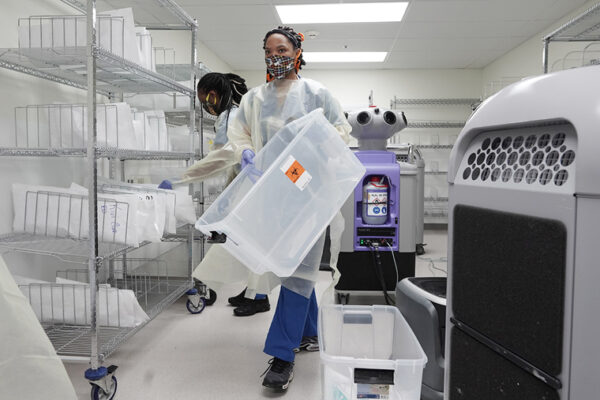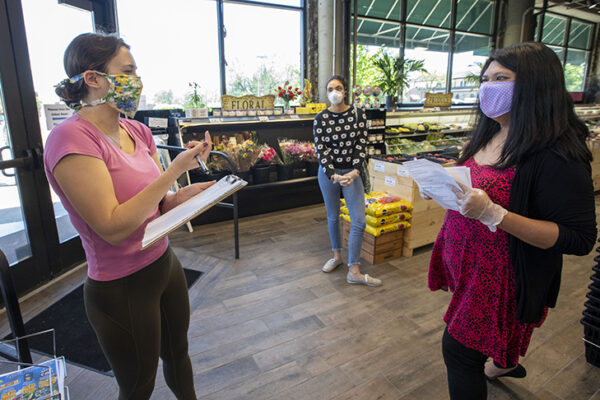An international research network of physicians and scientists is launching a clinical trial to evaluate whether the vaccine for measles, mumps and rubella (MMR) can protect front-line health-care workers against infection from SARS-CoV-2, the virus that causes COVID-19. The trial aims to enroll up to 30,000 health-care workers globally.
Washington University School of Medicine in St. Louis is the clinical coordinating center for this ambitious, international trial, which is the first to evaluate on a large scale whether the MMR vaccine can protect against COVID-19. The trial is co-led by Washington University, University College London and the University of the Witwatersrand in Johannesburg, via the CROWN (COVID-19 Research Outcomes Worldwide Network) Collaborative and involves researchers from institutions in African, European and North American countries.
The MMR vaccine has been given safely to hundreds of millions of people around the world since it was approved nearly 50 years ago, and has successfully reduced the incidence of measles, mumps and rubella worldwide. Typically, the vaccine is given to children, with most getting two doses before age 6. The research team leading the trial points to growing evidence that suggests the MMR vaccine may have benefits beyond protecting against measles, mumps and rubella. It could broadly boost an individual’s immunity and may prevent infection from SARS-CoV-2 for a limited period. This is because the vaccine carries small amounts of live, weakened viruses that could train the body’s immune system to fight multiple pathogens.
“We know that the MMR vaccine is safe, and we think there are two main reasons that it could prevent COVID-19,” said one of the collaborative’s principal investigators, Michael S. Avidan, MBBCh, the Dr. Seymour and Rose T. Brown Professor and head of the Department of Anesthesiology at Washington University. “The first is this vaccine includes small amounts of live but very weakened measles, mumps and rubella viruses. This type of vaccine appears to strengthen the body’s immune response to infections in general, not just to the viruses in that particular vaccine.”
A second reason the MMR vaccine may be effective is that there are similarities between the weakened viruses in the vaccine and the SARS-CoV-2 virus that causes COVID-19. All of these viruses have similar proteins on their surfaces that are involved in infecting cells in the body, so the researchers think that antibodies made in response to the MMR vaccine also may recognize and fight the SARS-CoV-2 virus.
Unlike the drugs remdesivir and dexamethasone, the only medications so far identified as being helpful in treating COVID-19, the MMR vaccine would not be used to aid recovery from illness. Instead, the researchers want to learn whether the vaccine can elicit an immune response that slows the spread of the virus and protects front-line health-care workers who work in high-risk settings from developing COVID-19. The vaccine also will be examined to see whether it might reduce the severity of illness for those who do become infected.
Most health-care workers enrolled in the trial will receive a booster, as they likely received the vaccine as children. But in some countries where the MMR vaccine isn’t widely given to children, health-care workers may be receiving the vaccine for the first time.
The CROWN Coronavirus Prevention (CORONATION) adaptive trial platform launched as the global pandemic was beginning. The researchers designed the platform to be nimble and to assess multiple interventions. They initially planned to evaluate the anti-malaria drug chloroquine. However, as emerging data showed the drug was not as promising as originally thought, the trial platform quickly pivoted to evaluate a different intervention.
“The CROWN Collaborative research platform was designed to rapidly evaluate preventive and therapeutic interventions to learn which ones work and which ones do not,” Avidan said. “Our goal from the start has been to identify interventions that work and make them available to the people around the world who will benefit most.”
The CROWN CORONATION trial is funded by a $9 million grant from the COVID-19 Therapeutics Accelerator — an initiative launched by the Bill & Melinda Gates Foundation, Wellcome, and Mastercard, with support from an array of public and philanthropic donors. The Therapeutics Accelerator works to speed up the response to the COVID-19 pandemic by identifying, assessing, developing and scaling up treatments.
The study will recruit front-line health-care workers, including those from lower- and middle-income countries. The countries involved include Canada, Ghana, Ireland, South Africa, Uganda, United Kingdom, United States, Zambia and Zimbabwe. In many of those nations, there are relatively few health-care workers per capita, and protecting them from severe COVID-19 infection could provide a substantial public health benefit and help reduce community spread of the virus.
Mary Politi, a leader in health decision-making and a professor of surgery in the Division of Public Health Sciences at Washington University, said she is particularly enthusiastic about the design of the study.
“We are focusing on health-care workers and their safety so that they can continue to care for infected patients around the world,” Politi said. “In addition to helping us learn whether the MMR vaccine can keep those front-line workers healthy, study participants will be receiving education about COVID-19 and will be screened for evidence of infection. The MMR vaccine has added benefits in that it is very safe and provides protection from viruses, including measles, that have made a resurgence in some communities.”
Health-care workers in the trial will be divided randomly into two groups. One will receive the MMR vaccine, while the other group will receive an inactive placebo. Each participant will be followed for five months, and the entire trial is expected to last about a year. Those previously sick with COVID-19, those who are pregnant and those who have very weakened immune systems or are taking drugs that suppress their immune systems will not be eligible to participate.
Data from the trial sites will be compiled at University College London. Laurence Lovat, MD, PhD, a professor of gastroenterology and biophotonics, is the study leader in the United Kingdom.
“If we discover that the MMR vaccine can help train the body’s immune response to SARS-CoV-2 infection, then we will have something to administer very quickly, while waiting for more specific vaccines and preventive therapies to be developed,” Lovat said. “If the trial shows that the MMR vaccine can boost the body’s general immune response, we believe it may enhance the effectiveness of vaccines currently in development to prevent SARS-CoV-2 infection.”
The CROWN CORONATION trial’s other principal investigators are Ramani Moonesinghe, MD, a professor of perioperative medicine at University College London, and Helen Rees, MD, executive director of the Wits Reproductive Health and HIV Institute in Johannesburg.
“Many millions of people in the world received the MMR vaccine during childhood, and it is known to be extremely safe,” Rees said. “If this widely available vaccine turns out to be helpful, it could be a very important tool for protecting health-care workers, and we need additional tools beyond personal protective equipment and good hand hygiene, which remain vital in fighting the pandemic.”



